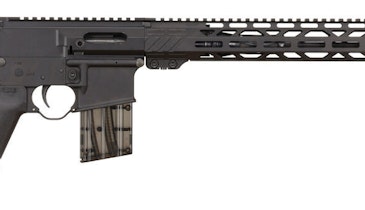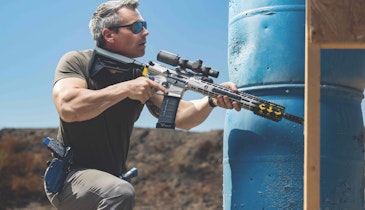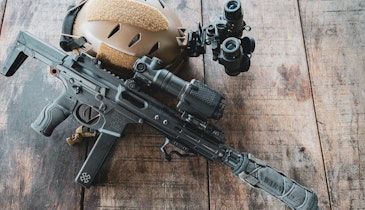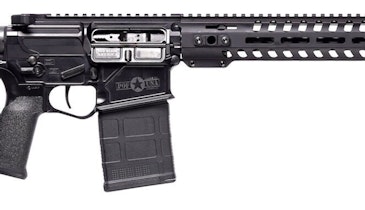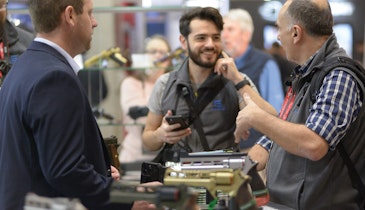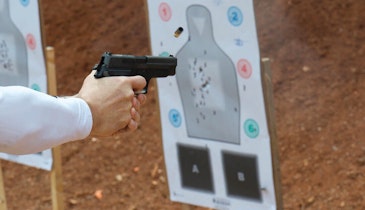Anyone dropping by the Crosman booth at the SHOT Show or visiting the company’s website knows they “ain’t dealin’ with no little BB gun company” anymore. Airguns — Airsoft — Optics — Youth Archery. It’s a whole lot of product ground to manage for one corporation. So how does Crosman do it, and where is it going from here?
Shooting Sports Retailer sat down with Crosman marketing VP Jennifer Lambert at the 2015 SHOT Show and asked about where the company has been and where it sees the noncombustion firearms market going.
SSR: Thanks for chatting with us, Jennifer. What is your background in business and industry?
Lambert: I’ve been with Crosman about two years. Before coming to Crosman, I had a diverse background, working for 10 years with Pepsi-Cola and in consumer package goods with Sun Products Corporation — they market laundry products like All, Wisk, Snuggle, and so on — and, most recently, with Bausch & Lomb. I’m not really a big-game hunter, but I’ve done some bird hunting and shot sporting clays and skeet.
SSR: How would you describe your shooting sports focus at Crosman?
Lambert: We encourage anyone who hasn’t done so to get out and try a modern airgun. I guarantee that if you had one when you were growing up, you’ll be blown away by their capabilities now. Once you get one in your hands and shoot it, you’ll be converted to a believer.
SSR: What’s the marketing crossover, Jennifer? And Crosman has a big-box-store reputation to overcome, doesn’t it? It seems that your experience would be a stretch as far as selling to independent gun stores is concerned.
Lambert: Crosman sells to a lot of the same customers with their airgun and airsoft products as I did when I was in consumer package goods. I’m familiar with the dynamics of the mass retailers, but I also understand and am very sympathetic to smaller sporting goods retailers.
At Crosman, we want to make airgun shooting accessible to everybody, so we don’t the least bit apologize that we sell to Wal-Mart and Dick’s Sporting Goods. As an internationally competitive merchandiser, we have to work the entire retail chain, from the biggest box store outlet to the smallest mom and pop business. After all, the customer, the end user, who walks into a mass merchant to look for something relatively inexpensive isn’t the same person who goes to a savvy firearms retailer shopping for a fine big-game rifle and scope. Crosman has airgun products that fit both of those niches.
Products we sell through mass merchants are focused on the entry-level youth market, recruiting youth to the shooting sports … and adult break-barrel guns that are great in the backyard for target shooting, squirrels, pest control and such.
SSR: Speaking of niches, what happened to paintball and archery? Crosman was strong in paintball for quite a few years with the Game Face brand. There was even a dedicated paintball room at SHOT for a couple years.
Lambert: Crosman got out of the paintball market before I was hired, but here’s how I understand that niche trajectory.
Paintball built up quickly in the 1990s but then dropped off significantly. Lots of retail stores got into it somewhat late; got excited and put inventory on their shelves. When that didn’t sell, didn’t turn, business people were scared off and pulled back from making a shelf space commitment. It became a self-perpetuating cycle.
There is still an active paintball market, though it’s much smaller, much more challenging now than it was at one time. We just don’t believe paintball is a growth industry, so that’s not where we are looking to focus.
SSR: And what about archery?
Lambert: Actually, we have expanded our line this year. We’ve never been a large player in archery, but we are interested in developing kids and, of course, taking advantage of the youth market. This year we brought out four new youth bows that we’re showing to customers now.
SSR: It looks like you’ve also expanded your airsoft and CenterPoint optics lines.
Lambert: Yes, that’s true. Both lines are affordable and offer a lot of value for the dollar.
Airsoft is especially interesting because I’d say it’s a more democratic sport than paintball. What I mean is that you can play airsoft games in your backyard without having to go to a facility and pay for an experience. So for a lot of young people, airsoft is like the next step up from Nerf balls and into fantasy gaming and such. We believe air soft continues to have a very good future.
SSR: Jennifer, do all of these products come from China?
Lambert: Well, lots of airsoft equipment is manufactured in China, but we actually build a lot of our airsoft guns, especially the pistols, in our factory in Bloomfield, New York. Like every manufacturer with a complex product line, we import scores of items.
Our high-end pre-charged pneumatic — PCP — airgun line is made in the U.S., though. And there are strict commercial rules about when and how you can label things as “Made in the U.S.,” but the component value of our PCP guns is significantly weighted to U.S. manufacture. All assembly takes place domestically.
SSR: I wonder if the big change — for Crosman and the industry as a whole — is the developing interest in high-power PCP airguns.
Lambert: I think that’s right. More and more states are recognizing the power and efficacy of airgun shooting for an ethical kill during hunting seasons. Three states now allow .30-caliber and up airgun hunting for deer, and numerous other states allow airguns for small game, turkeys and predator hunting, so we see a great opportunity here.
SSR: I looked at the new Bulldog .357 PCP, and I was familiar with the Marauder from last year — very impressive shooting tools. More to come, perhaps even larger calibers? I think the Lewis and Clark Expedition carried a .46-caliber air rifle that was very impressive on the frontier back in the day.
Lambert: We’re not developing any larger calibers at this moment. I don’t want to speak too much to our innovation plans, but I believe more states are going to allow power air for hunting, and more power is definitely a benefit. So we do see opportunities in the expansion of the larger calibers and development at the higher end of the PCP market.
Actually, I think there are huge opportunities for independent dealers in the PCP platform. These are powerful guns, and they’re not cheap.
We’re working on a new display rack for retail stores; a free-standing display will have one of all the high-end PCP guns. The rack will offer a dealer an opportunity to take a commission on direct shipment by displaying one each of our high-power guns. It’s a no-risk way to test the PCP market waters and participate in the growth of that hunting and shooting platform. We’re excited about it.
SSR: Is acceptance of PCP shooting going to evolve in the same manner as acceptance of the crossbow? Slowly and state-by-state, but ultimately successful in opening a new sales and shooting opportunity?
Lambert: We work with individuals at the state level to show that our PCP airguns are fully capable of efficiently taking big game. We support individuals who are working to update legislation. I think you’ll see nothing but a progressive upswing in states opening to the idea that PCP airguns can take big game.
SSR: How long will it take? After all, we’re pretty well entrenched in the idea of firearms for big game. Even archery fought an uphill battle back in the mid-1900s.
Lambert: I think as soon as dealers are ready to get into the market with us they’ll find there’s business to be had. It’s a self-snowballing phenomenon. As more and more dealers carry our guns and more people experience them and see what they can do, the greater the demand.
SSR: Do you have any tips for prospective PCP retailers?
Lambert: If a retailer has a good sense of their customer base on the firearms side, we can work with them to translate their insights into a presentation that will be successful on the airgun side. A retailer that focuses on entry-level shooting, we might focus on low-power pistols, break-barrel rifles and so on. It’s the elite retailer who offers quality hunting rifles, scopes and maybe gunsmithing, well … we would definitely work with them to introduce the PCP lineup to their staff and customers.

